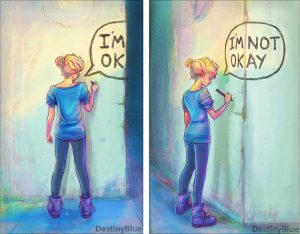If someone can be identified as having a disability, it is usually due to an outwardly observable feature, so what happens when someone is de-habilitated without any apparent signs? For many, mental illness can prove to be equally as immobilizing as any physical disability would. But do those who experience this sort of disability, one that consists of a sort of feigned invisibility, experience the same stigmatization and marginalization that the physically disabled are often subjected to? And how do those plagued by mental illness choose to represent a disability that can not be seen? Many, whom can access the medium, choose to use forms of art, that are then digitally published, as a way to try and physicalize their struggles, as seen in modernmet.com, and exemplified in the moving, photographical account of a personal struggle with depression: “Melancholy – a girl called depression” by Janelia Moul. Artists publish their personal thoughts and experiences through unconventional eyes, and their products, by all standards, fit those of a life-narrative. As a sort of alternative autobiography, these pieces appear to focus less on the specific experiences of the individual, instead placing emphasis on the author’s overall emotions. Because of this shift of focus, short works are often able to conjure a complex reaction from their audience, that a traditional, book-length, autobiographical piece would succeed in producing only after approximately three hundred pages.Through mediums such as drawing and photography, the artists seem to portray an unified feeling of isolation.
Many of these works have the ability to be placed within G.T Couser’s “rhetoric of horror”, which he explains in his article “Rhetoric and Self-Representation in Disability Memoir”, as a narrative that casts disability in a gruesome light (34). Similarly, in these pieces of art, the author’s illness is painted (or drawn, or pictured) as something to be avoided at all costs, as they evoke dismal emotions within their audiences. But some, such as much of Destiny Blue’s artwork, have the potential to align with Couser’s “rhetoric of emancipation”, which Couser discusses as a “rhetoric” that could be used to critique society’s stigmatization of the disabled (33).
For  example, this picture by Blue, referenced on modernmet.com in “Eye-Opening Illustrations Shine a Light on Hidden Signs of Mental Health Struggles” by Sara Barnes, openly criticizes society’s ignorance and demonstrates how the mentally ill can often go ignored, or unnoticed.
example, this picture by Blue, referenced on modernmet.com in “Eye-Opening Illustrations Shine a Light on Hidden Signs of Mental Health Struggles” by Sara Barnes, openly criticizes society’s ignorance and demonstrates how the mentally ill can often go ignored, or unnoticed.
This theme of isolation appears to be reoccurring in many of these ‘auto-biographies’; this would serve to suggest that the mentally ill, as a group, do, in fact, experience similar feelings of marginalization to those of the physically disabled. CBC cites a survey conducted by Insights West and released by the UBC Student Union, in their story: “Improving access to mental health counselling a priority at UBC” by Natasha Frakes, that found that only 17% of students had been helped by any of UBC’s counselling services, a very disproportionate number compared to the 36% of students who reported, during a survey conducted by the National College Health Assessment (NCHA), that they had symptoms of depression, as cited by The Ubyssey in their article: “Student depression on the rise: how is UBC coping?” by Jonny Wakefield. But because of the nature of these seemingly silent illnesses, even their marginalization can sometimes go un-noticed, and can end up resulting in a sort of marginalized form of marginalization.
Works Cited
Mould, Janelia. “My Conceptual Self-Portraits Tell The Story Of Depression.” Bored Panda, Mar. 2017, www.boredpanda.com/a-girl-called-melancholy-the-story-of-depression-conceptual-self-portraits/. Accessed 21 October 2017.
Couser, G.T. Rhetoric and Self-Representation in Disability Memoir. Signifying Bodies. University of Michigan Press, 2009.
“Eye-Opening Illustrations Shine a Light on Hidden Signs of Mental Health Struggles.” My Modern Met, 11 Oct. 2017, mymodernmet.com/mental-health-art/. Accessed 21 October 2017.
Frakes, Natasha. “Improving access to mental health counselling a priority at UBC.” CBCnews, CBC/Radio Canada, 24 Aug. 2017, www.cbc.ca/news/canada/british-columbia/improving-access-to-mental-health-counselling-a-priority-at-ubc-1.4256299. Accessed 19 October 2017.
“Student depression on the rise: how is UBC coping?” The Ubyssey, 6 Mar. 2011, old.ubyssey.ca/features/student-depression-on-the-rise-how-is-ubc-coping/. Accessed 19 October 2017.